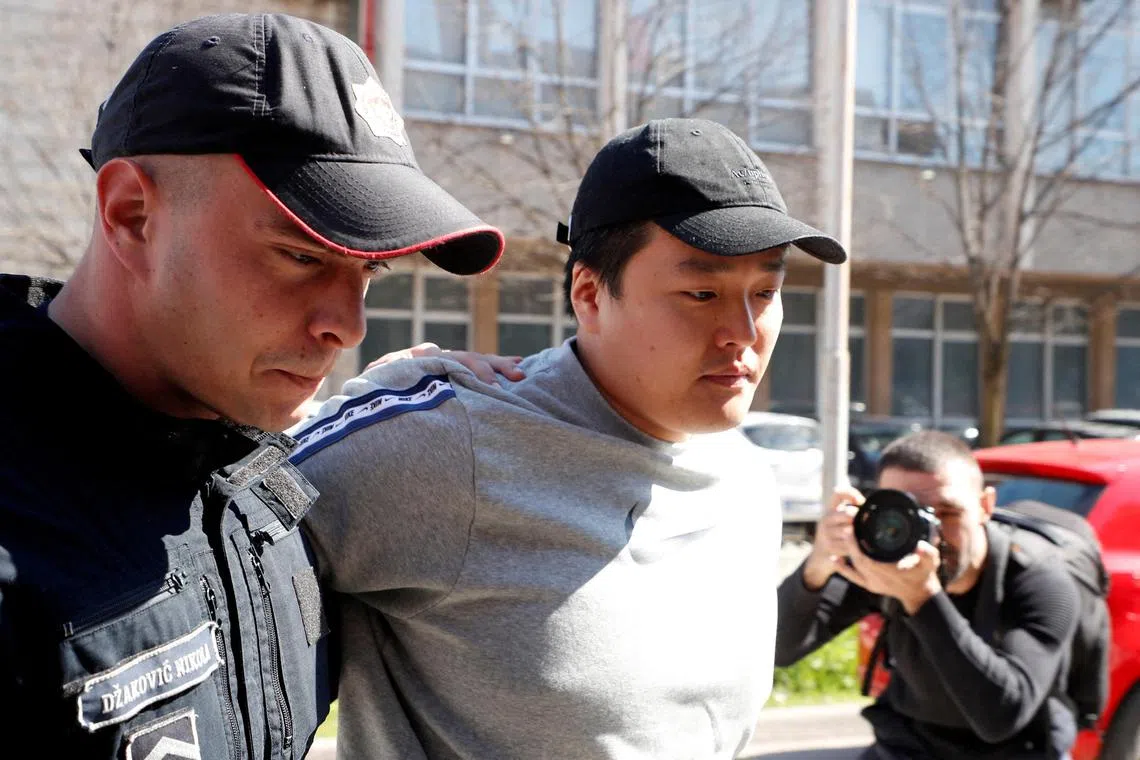Class action with 377 parties against Terraform, Do Kwon to move ahead in Singapore court
Sign up now: Get ST's newsletters delivered to your inbox

Terraform Labs co-founder Do Kwon being taken to court in Montenegro on March 24, 2023. The proceedings in Singapore are said to be the furthest a class-action suit has progressed internationally against Terraform and its co-founders.
PHOTO: REUTERS
SINGAPORE - A class action brought against Terraform Labs and its co-founders is moving forward.
This comes after the High Court on Nov 30 dismissed an appeal that had been filed by the defendants.
The case is one of several lawsuits that have been filed against Terraform
Terraform is a Singapore-incorporated company that developed and operates the Terra blockchain, and was responsible for issuing and marketing the UST cryptocurrency.
The Business Times understands that this is the furthest a class-action suit has progressed internationally against Terraform and its co-founders.
The suit was filed in September 2022 by Spanish citizen Julian Moreno Beltran and Singaporean Douglas Gan on behalf of 375 others.
They have alleged fraudulent misrepresentation by Terraform; its co-founders Do Kwon and Nikolaos Alexandros Platias; and Luna Foundation Guard, an organisation supporting the stability of UST by building reserves.
The claimants allege that these misrepresentations induced them to purchase UST, stake the tokens and hold on to them even as their value plummeted.
UST – which was supposed to be pegged to the United States dollar on a 1:1 ratio – suffered a collapse in confidence in May 2022.
It was trading at around five US cents on the day the court’s grounds of decision were released.
The individuals claim they suffered losses of close to US$57 million (S$76 million).
Terraform had tried to get the suit thrown out on the grounds that the terms of use on its website contain an arbitration clause – users were alleged to have waived their rights to trial by jury or participation in a class action.
Lawyers for the defendants tried instead to shift the legal action to “confidential arbitration proceedings” as they argued that the court has no jurisdiction.
The assistant registrar (AR) earlier in 2023 denied the application for a stay in favour of arbitration.
In its grounds of decision, the AR said the defendants had failed to establish an arbitration agreement between the company and the claimants in the action.
The terms of use were located at inconspicuous parts of the website and there was also insufficient effort to highlight those clauses to users.
Kwon and his companies filed an appeal against this decision, which was heard by Justice Hri Kumar Nair on Sept 25.
The grounds of decision released on Nov 30 said Terraform’s conduct of the matter up to that point meant that it had accepted the Singapore court’s jurisdiction over the matter – and thus did not have the right to move the proceedings into arbitration.
Terraform’s acts included filing a defence on the merits of the suit as well as a counterclaim, and seeking substantive remedies such as a request for further and better particulars that did not concern a jurisdictional challenge.
Although the court ruled that Terraform had managed to establish a prima facie case of an arbitration agreement, the fact that Terraform had taken a step in the proceedings meant that it accepted the jurisdiction of the court and should no longer be granted a stay in favour of arbitration.
Kwon, Terraform and Luna are represented by Mr Lawrence Teh, Ms Melissa Thng and others of Dentons Rodyk & Davidson; while Mr Platias is represented by Mr Danny Ong, Mr Jason Teo and Ms Mazie Tan of Setia Law.
The appeal had been filed by Terraform and case management stays were requested by Kwon, Luna and Mr Platias.
As the latter’s stays were predicated on Terraform obtaining an arbitration stay, their appeals have also been dismissed.
Meanwhile, the 377 claimants are represented by Mr Mahesh Rai and his team from Drew & Napier.
Justice Nair noted, in his closing observations, that the suit had been served in September 2022 but that Terraform’s jurisdictional challenge was heard only in June 2023.
This delay of more than nine months was regrettable, he said.
Singapore introduced new legislation – called Rules of Court 2021, or ROC 2021 – that came into operation in April 2022. ROC 2021 is meant, among other things, to enhance the speed of adjudication.
“That philosophy was not embraced in this case, and parties (particularly Terraform) engaged in the old ways of procedural and strategic manoeuvres unrelated and unnecessary to resolving the jurisdictional challenge,” the judge said.
“As far as a party’s actions in delaying the judicial process are not intentional or disingenuous, some lenience may be granted.
“However, where such conduct is deliberate or unreasonable, parties should expect to be met with firm sanctions from the court.” THE BUSINESS TIMES


